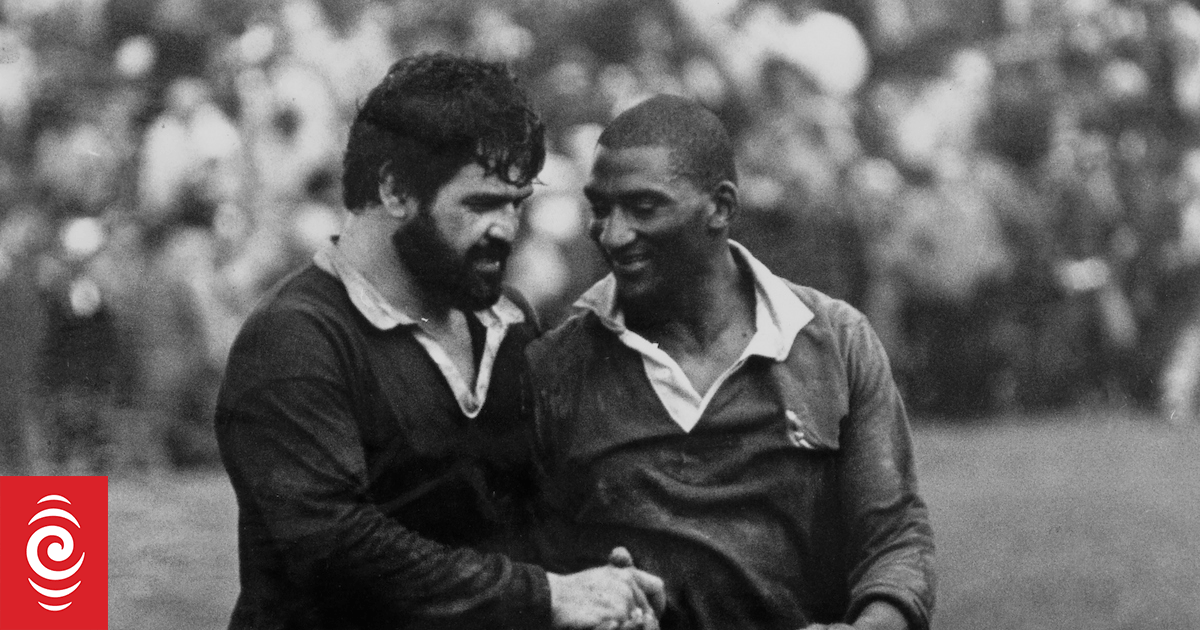Bill Bush shakes hands with Errol Tobias after the Maori All Blacks and Springboks’ famous 12-all draw at McLean Park, Napier, 1981. Tobias was the first South African Black player to tour New Zealand with the Springboks.
Photo: © Photosport Ltd www.photosport.co.nz
Analysis – As we build towards the clash between the All Blacks and Springboks, the greatest rivalry in rugby had a somewhat inevitable reminder of its painful past. News came through over the past 48 hours of the intention by SA Rugby to formally apologise for the exclusion of Māori (and presumably Pasifika) players for being excluded from touring apartheid-era South Africa.
The proposal was put forward by SA Rugby president Mark Alexander, whose career was shaped by the fact that as a coloured player, he was restricted to a separate competition to white and native African players. Selection for the Springboks was impossible, even if they hadn’t been banned from test matches during Alexander’s career.
There’s a couple of issues though. The first being that while Alexander’s invitation for the Māori All Blacks to tour South Africa next year was probably done with the best of intentions, the team has previously run into trouble due to the country’s complete post-apartheid course correction regarding selection and sporting contact.
The other one is that both SA Rugby and NZ Rugby have actually already said sorry, 15 years ago and in a way that directly involved the Māori All Blacks. The reason why perhaps it’s not so well remembered is that it was an event that both governing bodies were prodded into and ended up as a more of a political points-scoring effort in the Beehive.
Photo: RNZ / Alexander Robertson
2010 marked a century of Māori representative sides in New Zealand, which included by a couple of rare fixtures against tier one opposition. The then-NZ Māori team were due to face Ireland and England in June, however in May the old issue of sporting contact with South Africa was brought up by Green Party MP Keith Locke, a veteran protester from the 1981 tour. Then-Prime Minister John Key was asked by Locke whether he would be apologising for the previous National-led government’s role in sanctioning the historic tours that excluded players.
The issue had come to light when South Africa’s Sport and Recreation Minster Reverend Makhenkesi Arnold Stofile sent a public letter of apology to Māori players who were left out of the 1928, 1949 and 1960 tours. This caught the NZRU (now NZ Rugby) unaware, given that their previous stance on the issue was that no apology was necessary, they said, on the advice of the Māori Rugby Board.
However, this was disputed by board chairman Mike Eagle, who said: “At no stage were they against it; the timing just wasn’t right in their opinion. The public reaction around this apology certainly created more harm than good and it could have escalated during the centenary year.”
But again this was contradicted by fellow board member Wayne Peters, who claimed that apologising to help people move on was “irresponsible”.
NZRU CEO Steve Tew eventually issued a statement saying: “It is even more complicated in South Africa where the very people who are apologising now were victims of the regime that they are apologising for. They had a degree of urgency because they had some political pressure from their government to get on and do it.
Steve Tews speaks to media about Spark and TVNZ coverage of The 2019 Rugby World Cup.
Photo: RNZ / Rebekah Parsons-King
“This has never been a straightforward issue. It’s one of the most complex issues that our country has dealt with in my lifetime. Frankly, there’s probably never any 100 percent right or wrong approach to it”.
A private apology was sent out, along with a media release, but nothing was formally said. There were official functions set up for the NZ Māori side’s upcoming fixtures, however officials stayed tight-lipped about actually making an apology at them. The release read:
“Today, on behalf of the New Zealand Rugby Union, we wish to say sorry first and foremost to those Māori players who were not considered for selection for teams to tour South Africa or to play South Africa. We apologise to the families of those players and to the wider Māori community who were affected directly or indirectly by the decisions taken to not include Māori players for those teams and tours.
“It was a period in which the respect of New Zealand Māori rugby was not upheld and that is deeply regretted.”
Oregan Hoskins and Springbok captain Jean de Villiers.
Photo: Allan James Lipp/Photosport
The South African Rugby Union followed suit, with president and Alexander’s predecessor Oregan Hoskins calling a press conference to apologise as well:
“As the current guardians of the game of rugby union it is therefore appropriate that we take this opportunity to apologise to those Māori players who may have been excluded from selection and to the offence this may have caused to the Māori community.
“But, even more importantly, this is the opportunity to apologise on behalf of rugby to black South Africans who were denied the opportunity to represent not only their country but also their provinces throughout those long dark years because of the connivance of our predecessors in the systematic suppression of the majority.”
For his part, Key remained stridently on the fence and said that it was a matter between the rugby unions. He obviously realising what a mess it could create if he got involved, as his stance on either side of the apology by NZRU attests to. In 2008, Key was asked during a leader’s debate in that year’s election about his time as a student in Wellington, specifically the year he was 20: 1981. He stated he was pro-tour, but then when asked again in an interview in 2013 he claimed he “can’t even remember”.

